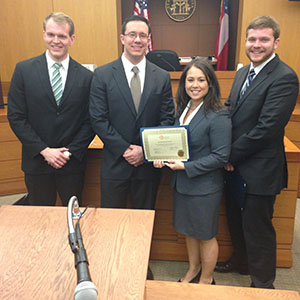Moot Court Team Advances to Nationals
 Georgia State University College of Law's Trademark Moot Court team won second place Feb. 8 in the International Trademark Association's Saul Lefkowitz Competition, which addresses issues in U.S. trademark and unfair competition law.
Georgia State University College of Law's Trademark Moot Court team won second place Feb. 8 in the International Trademark Association's Saul Lefkowitz Competition, which addresses issues in U.S. trademark and unfair competition law.
Team members Jennifer Grant (J.D. '14), Matt Littlefield (J.D. '14), Richard Piercy (J.D. '14), and Clay Roberts (J.D. '14) participated in the 22nd annual event honoring Saul Lefkowitz, who dedicated his career to the development of trademark law. The team had to prepare a brief reflecting the issues in the memorandum opinion, which outlined a fictional case, Blue Fin Surf Sports, Inc. v. Skuyler Finn Enterprises, LLC, and Skuyler Finn, then argue their case in front of a panel.
"Working with Richard, Clay and Matt has been one of the most rewarding experiences I have had at law school," Grant says. "In Moot Court you have to work with a team, research and collectively write a brief arguing your side. Then you have to get up in front of judges, speak and answer questions. It seemed like a daunting task, but the Lefkowitz team made it fun and at the same time made me a better competitor, student and future lawyer."
Alexander Hoffspiegel (J.D. '13), coached the team, which spent two months preparing its brief, exploring whether the district court erred in concluding that the defendants' Skuyler Finn Blue Mark for snowboards could be confused with the plaintiff's Blue Fin by Lulu Mark for surfboards and retail services. It also addressed whether Blue Fin by Lulu surfboards could gain priority by being in the "natural zone of expansion" of the Blue Fin Surf Shop.
To prepare for oral arguments, the team relied on other Moot Court members and faculty members who benched their practice rounds and provided feedback. Hoffspiegel also coordinated off-campus practice rounds at local law firms, which the team called incredibly beneficial.
"It is very difficult to advance in this competition, because only the top two teams out of each region move on to nationals," Hoffspiegel says. "The team was very excited to advance. It vindicated that their hard work paid off in the end."
The team earned the Best Brief award, beating about 15 other teams. They came in second overall after arguing the case before a panel of volunteer attorneys, judges, including justices David Nahmias and Carol Hunstein of the Georgia Supreme Court, and members of the Trademark Trial and Appeal Board of the U.S. Patent and Trademark Office.
This marks the first time that the Trademark Moot Court team has advanced this far in the competition. Roberts attributes their accomplishment to their team effort and determination.
"Between research, writing and editing, we were successful at making the most compelling brief at the regional competition. It felt great to represent Georgia State Law among a host of other great schools, including Emory University, University of North Carolina and University of Florida," Roberts says.
As the Moot Court vice president of research, writing and advocacy, Littlefield says winning Best Brief stands as is his "proudest moment in law school thus far."
The team will compete against seven others in the national finals at the U.S. Court of Appeals for the Federal Circuit in Washington, D.C., on March 16.
"Many of the most seasoned intellectual property litigators never get to argue at the Federal Circuit. To have the opportunity to do what so many wish they could is second to none," Littlefield says.
"Winning best brief was unreal, reaffirming and predictable all at the same time," Piercy says. "We knew we wrote a really good brief, but it was great that everyone else thought so too. Our brief score counts for 50 percent at nationals, which gives us a fighting chance to place first."